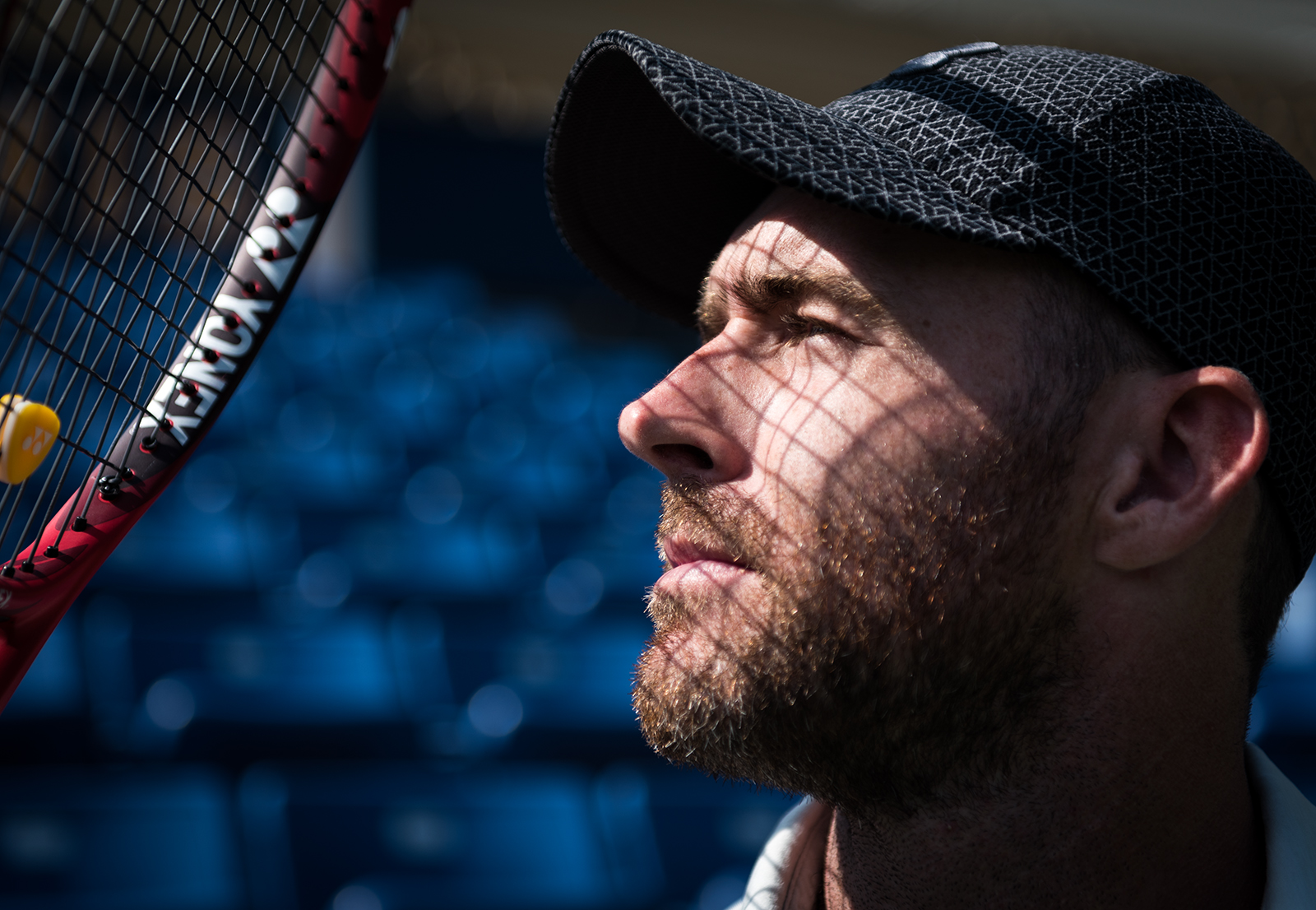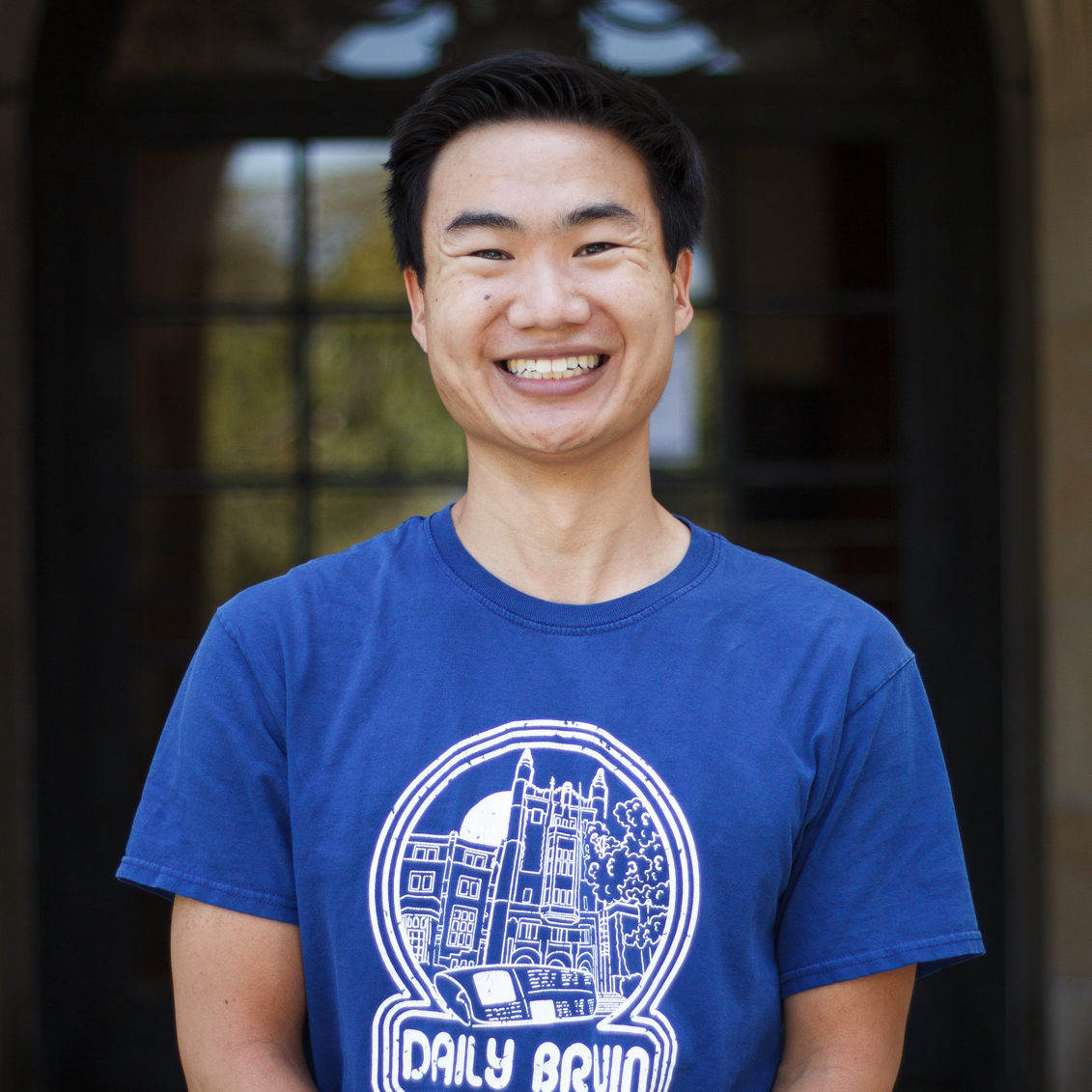Assistant men’s tennis coach’s background serves as baseline for career

UCLA men’s tennis assistant coach Rikus De Villiers grew up playing junior tennis in his native country of South Africa before making the journey to the U.S. to play collegiate tennis. As he climbed the junior ranks of his home nation, De Villiers was often expected to financially support his budding career on his own – one of many obstacles he faced as he strived to break into the professional level of the sport. (Liz Ketcham/Photo editor)

By Jared Tay
Oct. 16, 2019 1:17 a.m.
It’s been over a decade since Rikus De Villiers made the journey to Pepperdine for his first season of collegiate tennis.
But the now-UCLA men’s tennis assistant coach’s eventual trip from Malibu to Westwood wasn’t the longest leg of his journey.
Originally born in Cape Town, South Africa, De Villiers moved to Durban – a city along the country’s eastern coast – when he was about 3 years old. And once his family settled there, De Villiers started to learn tennis from his father.
De Villiers’ path as a South African player – from hitting against a tennis wall to playing on the professional tour – wouldn’t come without its challenges though.
“I liked a variety of sports,” De Villiers said. “I liked cricket, rugby, tennis, track and field, things like that, so I did a variety of things. From a young age, I was good at tennis, and since my dad was a good tennis player, that’s what I was focusing on.”
Even with his focus on tennis, there were factors that were out of his control.
As De Villiers began to play in the junior circuit of South African tennis, he said he saw a lack of funding for tennis. The sport’s popularity in South Africa did not stack up to rugby and cricket, according to De Villiers.
“It’s not a big sport (in South Africa),” De Villiers said. “If you drive around California, you will see people playing on the courts, but that’s not the case in South Africa. It’s generally an expensive sport to play because you need good equipment and good coaching, and you’re not joining a team where you get given a lot of things.”
And as De Villiers climbed the junior ranks and began playing tournaments farther from home, his family bore the financial burden of supporting his budding tennis career.
The lack of high-profile tournaments in South Africa made it nearly impossible for Tennis South Africa to increase its profits. Today, the Rainbow nation still is not a host to any ATP or WTA tournaments.
“We have no big tournament that brings in revenue,” De Villiers said. “In the U.S., there are a variety of tournaments where people will pay to go see them, and there’s money to be made. In South Africa, there are no tournaments like that, so there is nothing to fund the players and their playing time.”
But De Villiers wasn’t alone in his battle to make it to the pros in South Africa.
Ruan Roelofse was one of De Villiers’ regular opponents in the junior circuit and reached a career-high ranking of No. 122 in the world in 2016. Off the court, the two were facing a lot of the same obstacles as they rose through the junior rankings.
“We mostly played in Africa unless we got the opportunity from the (International Tennis Federation) to go to Europe or America to play,” Roelofse said. “Besides it being far away, the economy was also not the strongest so it was very unaffordable to travel.”
Both De Villiers and Roelofse said it wasn’t uncommon for many of the nation’s best athletes – not just in tennis – to pursue their careers elsewhere.
Roelofse himself traveled to the U.S. to play collegiate tennis at the University of Illinois. And Kevin Anderson – the highest-ranked South African on the ATP World Tour also played his collegiate career for the Fighting Illini.
While South Africa Tennis may not have fully backed native South African juniors in the 1990s, Roelofse said he has seen improvement in the organization’s promotion of tennis.
Roelofse said one of the areas he has seen improvement has been in the salary he receives for representing Team South Africa at the Davis Cup – a knockout competition organized by the International Tennis Federation among teams of opposing countries.
“They take better care of us,” Roelofse said. “Without that, I wouldn’t be playing right now. It’s not a lot of money, but it keeps me alive in the times when you’re not doing as well.”
In a country where an estimated 30.4 million people were living in poverty – according to a government survey conducted in 2015 – De Villiers said the tennis community can do more to provide young kids with the opportunity to play sports, fostering their talent and giving them a way out.
“(Organizations are) starting outreach programs where they are giving young African kids the chance to play, and in doing so, they find kids that show some talent or interest and try to help develop their skills,” De Villiers said. “To really make a difference, it needs to start at a young age, to make the kids see that this is an opportunity to get out of their situation.”
The lack of opportunity and a combination of other factors led De Villiers to pack his bags and go abroad to play collegiate tennis at Pepperdine.
Yet after playing just one season with the Waves, De Villiers decided it was time for a change.
“Because I didn’t visit (Pepperdine), I didn’t really know what things were like there,” De Villiers said. “The kind of people I met were just not really the kind of people I related to. The students drive Porsches and coming from South Africa where I had to push the car to start it almost every day before school, it’s a different environment entirely.”
And so in the 2008-2009 season, De Villiers packed his bags once more and transferred to Fresno State – still a Division I school, but a team that hadn’t won the Western Athletic Conference since 1999.
“I wasn’t particularly happy to go to Fresno State to be quite honest with you,” De Villiers said. “Looking back, I enjoyed my time here, and I met my now-wife there, and the team was pretty good. In the moment it’s harder to accept that your dream to play pro tennis was falling apart.”

Then, during one of his summers at Fresno State, De Villiers worked at a UCLA summer camp offered by men’s tennis coach Billy Martin.
When a volunteer assistant coaching position opened in 2012, Martin extended an offer to De Villiers, who accepted. In the five years De Villiers has served on the coaching staff, UCLA has gone 124-28.
Martin said De Villiers’ experiences in South Africa have demonstrated the 30-year-old’s maturity, something Martin said he regularly finds in his international players.
“(His experiences) matured him,” Martin said. “So many of the young American kids living in Los Angeles are not nearly as mature. Yes, we’re here as coaches helping them do whatever they need, but we’re trying to get them to stand on their own two feet, and definitely (De Villiers) was in that mold like many foreign collegiate players are.”
But for De Villiers, he said his unique background has the power to connect him with each athlete he coaches, no matter where they come from.
“I think tennis is similar around the world in many ways,” De Villiers said. “But because I’ve had to deal with different things in South Africa and different places in South Africa, I think that helps me now because I’ve had to handle things on my own. When I have to help an 18- or 19-year-old going through some changes, I have experience to offer them.”


